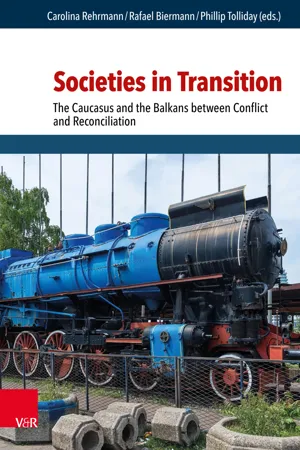
Societies in Transition
The Caucasus and the Balkans between Conflict and Reconciliation
- 351 pages
- English
- PDF
- Available on iOS & Android
Societies in Transition
The Caucasus and the Balkans between Conflict and Reconciliation
About This Book
Since the end of the Cold War, the collapse of the Soviet Union and the dissolution of Yugoslavia, the Mediterranean and Black Sea regions have been faced with multiple upheavals of interethnic violence, bloody secessions and ethnic cleansing. Up to the present, both regions are confronted with unresolved border, minority and security issues, matters of recognition, protracted traumata and claims for justice. After the fall of the iron curtain, simmering ethnic tensions turned into hot wars that created new states, new power-political hierarchies and a heritage of violence. Reaching back to the early 1990s, several international and national transitional justice measures have been applied to face these heritages and lay the foundations for a common future. For the former Yugoslavia, they range from broad criminal trials to a series of restorative justice mechanisms; in the North and South Caucasus they encompass numerous mediation measures and primarily restorative justice efforts.The present volume is concerned with strategies of conflict resolution and prevention subsumed under the concept of reconciliation. It aims at understanding the socio-emotional root causes of political cleavages and daily realities of (post-) conflict societies, especially regarding the impact of competing narratives and unprocessed pasts on exclusive identities and strategic political choices. Applying reconciliation theory, insights from collective memory and transitional justice to a series of selected field studies, it sheds light on the origins of interethnic violence, aims at finding explanations for the fact that many of the above-mentioned conflicts have become intractable and discusses the chances and challenges for transforming interests, emotions, perspectives, roles and identities between and within the respective societies.
Frequently asked questions
Information
Table of contents
- Title Page
- Copyright
- Body
- Carolina Rehrmann/Rafael Biermann/Phillip Tolliday: Introduction to the present volume
- Carolina Rehrmann: Emotional Reconciliation: Challenges, Prospects, and Inherent Contradictions
- Phillip Tolliday: Reconciliation: A Negotiation Between Anamnesis and Amnesia
- Rafael Biermann: The Politics of Reconciliation in Former Yugoslavia – Assessing Progress Across the Region
- Eva-Maria Auch: Conflict, Identity and Reconciliation in the South Caucasus
- Jovana Janinovic: The Socialist Heritage of Tito's Yugoslavia: Memory between Disneyfication and Reconciliation
- Ekaterina V. Klimenko: Russia in the Aftermath of the Chechen Conflict: Fostering Tolerance as Reconciliation Strategy
- Fernando Avakian: Discursive Construction of the Islamic Threat in the Russian Federation in the Early 2000s
- Michael Humphrey/Michelle Veljanovska: Between the ICTY and Dayton: Obstacles to Justice, Reconciliation and Peace in Postwar Serbia
- Mariat Imaeva: Deferring Human Rights: Humanitarian Exhumations as an Alternative Approach to Resolve the Issue of the Missing
- Despina Angelovska: The Failure of Macedonian Post-Communist Transitional Justice: Purging the Opponents, Lustrating the Dead
- Sonja Arsham Kuftinec: Theatrical Facilitation in Post-War Societies: The Case of Bosnia
- Vesna Nikolić-Ristanović/Sanja Ćopić: Dealing with Conflicts in a Post-Conflict Society: A Restorative Initiative in Serbia
- About the Editors
- About the Authors
- Index